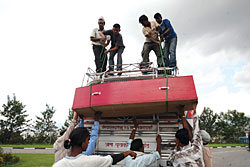 KIRAN PANDAY |
The family of Ramesh Giri, who died in a motorcycle accident in Saudi Arabia, received his body 22 months after his death. His bereaved mother pleaded with political leaders, trade union leaders and the prime minister, all in vain. She passed away before her son's body was brought back home. Similarly, Krishna Lal Sharma of Syangjha died in Saudi Arabia, but his body only arrived back in Nepal after 18 months. The bodies of Nepali migrant workers Shambhu Lal Shrestha, Harka Bahadur Magar, Dut Bahadur Budha, Harka Bahadur BK and Ganga Thapa are still in the morgues of various hospitals in Saudi Arabia. They have not been brought back to Nepal because their employers have refused to take responsibility, and their families cannot cover the expenses of repatriation.
As per Saudi regulations, the bodies of deceased workers should be sent back to their respective countries within two months, or they have to be buried. But many of these corpses remain unattended because of the illegal entry of the workers, the ineffectiveness of the Nepali embassy, the poverty of workers' families and the irresponsibility of manpower agencies. "We won the case of Ramesh Giri," says Khadga Prasad Dahal, first secretary at the Nepali embassy in Saudi Arabia. "We traced the sponsor (the Saudi agency that recruits workers). There are thousands of workers whose sponsors are not known."
As Giri's relatives were receiving his body at the airport, Krishna Bahadur Shrestha of Dolakha, leaving for Saudi Arabia to work as a driver, was saying, "The manpower company has asked us to tear up our labour permits as soon as we board the plane. We are supposed to call the number our manpower company has given when we get off the plane, and we will be received at the airport."
The deceased Giri had gone to Saudi through Sky Overseas, owned by Bal Bahadur Tamang. Giri left the company that had hired him and joined another as he did not get the salary and incentives he was promised. Shrestha will probably do the same, but if he runs into trouble without insurance or a company willing to take responsibility for him, he risks the same fate as Giri. "There are about 70,000 migrant workers who have fled their first company and are highly vulnerable to danger," says Dahal.


